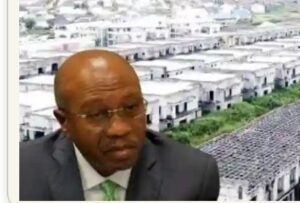Emefiele Challenges Forfeiture Ruling on Abuja Housing Estate
Emefiele Challenges Forfeiture Ruling on Abuja Housing Estate

Former Governor of the Central Bank of Nigeria, Godwin Emefiele, has filed an appeal at the Court of Appeal in Abuja, seeking to overturn a previous court decision that handed ownership of a 753-unit housing estate in Abuja to the federal government.
The Economic and Financial Crimes Commission (EFCC) had earlier secured a final forfeiture order on the estate, located in the Lokogoma area of the Federal Capital Territory. The property was initially said to have been recovered from an unidentified ex-government official.
However, Emefiele, through his legal counsel A.M. Kotoye, has entered the matter as an interested party. He argues that he should have been formally included in the original forfeiture proceedings and is now asking the appellate court to nullify the lower court’s judgment.
Emefiele is also requesting an extension of time to contest both the interim and final forfeiture orders issued in December 2024. He insists that the proceedings were conducted without his awareness.
According to the former CBN chief, the EFCC’s publication of the forfeiture notice was placed in a little-known section of a newspaper, making it nearly impossible for him to respond promptly. He further explained that during this period, he was occupied with multiple criminal trials in Abuja and Lagos, hindering his ability to track such notices.
In his application, Emefiele also accused the EFCC of intentionally withholding information about the forfeiture process, despite their ongoing communication with him in connection to other charges.
The Federal Capital Territory High Court, in a ruling by Justice J.O. Onwuegbuzie, dismissed Emefiele’s motion. The judge cited Section 17(2) of the Advance Fee Fraud and Other Related Offences Act of 2006, which lays out the required procedures for notification. The court also rejected Emefiele’s claim that the newspaper notice was obscure, asserting that a half-page notice in a national daily was sufficient and could not be considered hidden.
Unhappy with this outcome, Emefiele lodged an appeal dated April 30, 2025. In the appeal, he named the EFCC as the sole respondent and requested the Court of Appeal to annul the trial court’s decision.
His appeal is based on four grounds, including the argument that the forfeiture orders were invalid because they were built on hearsay and unsubstantiated claims. He also asserted that no laws were broken in the acquisition of the properties in question and that the orders violated Section 44(1) of the 1999 Constitution (as amended).
Emefiele maintained that he has a legitimate legal and equitable interest in the estate and that the court should have acknowledged this before issuing the forfeiture orders.
Meanwhile, in a letter dated May 26, 2025, and addressed to the Minister of Housing and Urban Development, Emefiele’s co-counsel, A.O.M. Adebowale, called for a pause on any further action regarding the estate. The letter drew attention to the pending appeal and urged the ministry to refrain from disposing of the property through public auction.
The letter stated:
“We are writing to inform you of an active appeal currently before the Court of Appeal in Abuja, following the ruling of the Federal Capital Territory High Court delivered by Justice J.O. Onwuegbuzie on April 28.
“We have learned that the properties in question have been handed over to your ministry and may soon be offered for public purchase. Please be informed that a notice of appeal was served on the EFCC’s legal department on May 2, 2025, followed by a notice of injunction on May 22, 2025.
“In light of this, we respectfully request that all actions regarding the property be suspended pending the resolution of the appeal.”
TRENDING SONGS
 RCCG PASTOR ANGRY OVER CALLING Him“MR” INSTEAD OF “DR,” DECLARES CURSE ONLINE
RCCG PASTOR ANGRY OVER CALLING Him“MR” INSTEAD OF “DR,” DECLARES CURSE ONLINE
 NPMA Appeals to Nigerian Government for Compensation After Lagos Market Fire
NPMA Appeals to Nigerian Government for Compensation After Lagos Market Fire
 Rest Every Four Hours, FRSC Issues Safety Guide for Fasting Motorists
Rest Every Four Hours, FRSC Issues Safety Guide for Fasting Motorists
 NNPC Boss Ojulari Bags UK Energy Institute Fellowship
NNPC Boss Ojulari Bags UK Energy Institute Fellowship
 Shock in Anambra: Bride Disappears Moments Before Wedding
Shock in Anambra: Bride Disappears Moments Before Wedding
 Nigerian Woman Returns ₦330 Million Accidentally Credited to Her Account
Nigerian Woman Returns ₦330 Million Accidentally Credited to Her Account
 APC Don Reach Morocco?’ VeryDarkMan Reacts to Seyi Tinubu Poster
APC Don Reach Morocco?’ VeryDarkMan Reacts to Seyi Tinubu Poster
 Bride Breaks Down in Tears as Wedding Meals Were Kept Secretly While Guests Go Home Hungry
Bride Breaks Down in Tears as Wedding Meals Were Kept Secretly While Guests Go Home Hungry
 Odogwu by Day, Robber by Night: How Marriage Joy Turned Into Tragedy
Odogwu by Day, Robber by Night: How Marriage Joy Turned Into Tragedy
 Nigerian Officials Allegedly Pocket N4–6B Weekly Through Smuggling Cartels at Seme–Badagry Border
Nigerian Officials Allegedly Pocket N4–6B Weekly Through Smuggling Cartels at Seme–Badagry Border
Share this post with your friends on ![]()













